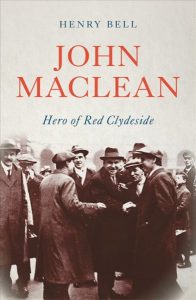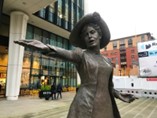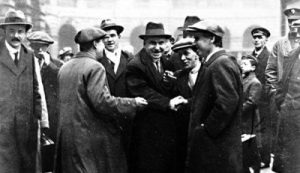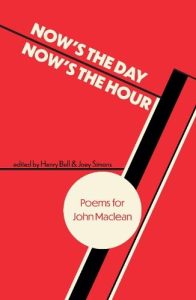The following article was written by Jim Aitken and was first posted by Culture Matters. It spotlights the exceptional concert held as part of Celtic Connections in Glasgow’s Concert Hall.
THE JOHN MACLEAN CENTENARY CONCERT
Celtic Connections put on a wonderful concert recently, in memory of Scotland’s great Marxist revolutionary, John Maclean (1879 -1923). Glasgow’s magnificent concert hall had the 2,000 strong audience deeply engaged with poetry readings and songs all commemorating a figure who entered Scottish folklore and legendary status after his untimely death, at the hands of a British state that had reduced him to appalling poverty and ill health.
Maclean’s parents were Highland clearance folk and came south to Glasgow to find work. Maclean became a primary school teacher in the city and was imprisoned several times for his anti-war activity in opposing the First World War which he said was –‘a bayonet… with a worker at both ends.’. He was given a brutal stint in Peterhead jail of five years hard labour and maintained his food was poisoned while he was there.
Large crowds turned out to meet him when he returned to Glasgow after his release. He founded the Scottish Workers’ Republican Party, Scotland’s first pro-independence party. Maclean also supported Irish independence and would speak at meetings in Glasgow in support of Irish and Scottish independence.
After his death his memory entered Scottish literature with Hugh MacDiarmid and Hamish Henderson, Edwin Morgan and others all writing poems and songs in his honour. In 1973 a pamphlet called Homage to John Maclean came out to commemorate him 50 years after his death. This pamphlet was published by the John Maclean Society which formed in 1968.
The centenary concert featured songs and poems from this pamphlet including Matt McGinn’s Dominee, Dominee, which is the Scots word for teacher. MacDiarmid had several poems in the pamphlet and at the concert his poem John Maclean was beautifully read by Scotland’s former Makar, Jackie Kay.

The evening was put together by Siobhan Miller and Henry Bell. While Siobhan is a singer who is well known in Scotland, Henry Bell is the author of possibly the finest biography written of Maclean which came out in 2018 called John Maclean: Hero of Red Clydeside, published by Pluto. Both should be congratulated for putting together such a fantastic evening with terrific performers.

Everyone who performed on the night was superb. Karen Casey, an Irish singer, caught the mood when she said she felt she could say whatever she wanted to say to such an eager audience. Karine Polwart, Karen and Siobhan came together to sing Mrs Barbour’s Army, written by Alistair Hulett, and recalling the struggle of Glasgow’s women in refusing to pay increased rents as their husbands fought in WW1. Mary Barbour was a formidable woman and a comrade of Maclean’s. A sculpture to her and her women comrades stands proudly outside Govan tube station.
Billy Bragg was well received but the best cheer of the night was for Dick Gaughan who has been singing and campaigning for socialism over decades in Scotland and beyond. He has performed at previous Celtic Connection events and the crowd seemed to give him such deserved applause precisely because he has been such a champion for socialism and internationalism over so many years. He told the crowd with pride that he was a Scottish Republican which went down well with them. He sang The Red Flag with Billy Bragg to its original tune of The White Cockade by Robert Burns. Eddi Reader sang Burns’ A Man’s a Man for a’ That in her very distinctive way of singing Burns’ songs. She has become by far the best singer of Burns’ songs in recent times.
What was rather moving was to see and hear Maclean’s granddaughter, Frances Wilson, who came on stage to read out one of her grandfather’s letters to her mother. That was a really special moment and she was clearly delighted to receive such applause and to realise that so many people still held her grandfather in such high esteem.
Maclean’s speech from the dock was also read out in which he says ‘I am not here, then, as the accused; I am here as the accuser of capitalism dripping with blood from head to foot.’ Such words are as relevant today as they were then.
Speaking to people after the concert, it was clear that many lamented the fact that such radical, internationalist politics is sorely lacking today. And after folk left the hall, they could have bought a copy of Now’s the Day, Now’s the Hour: Poems for John Maclean, published in late 2023 by Tapsalteerie. This book contains many of the poems and songs from the 1973 pamphlet along with new material from another generation of Scottish writers. The book is edited by Henry Bell and Joey Simons and was first launched in The Griffin bar near where Maclean would speak his anti-war, socialist and internationalist message.
The concert was very much a Scottish night but also an internationalist one. At the end of the concert both The Internationale and Henderson’s The Freedom-Come-All-Ye were sung by all the performers and by many in the audience.
John Maclean has been dead for one hundred years but his spirit clearly lives on in poetry and in song. If only his politics could live on too!
24.1.24
___________
also see:
Celebrating John Maclean at Celtic Connections – Alistair Davidson, bella caledonia


